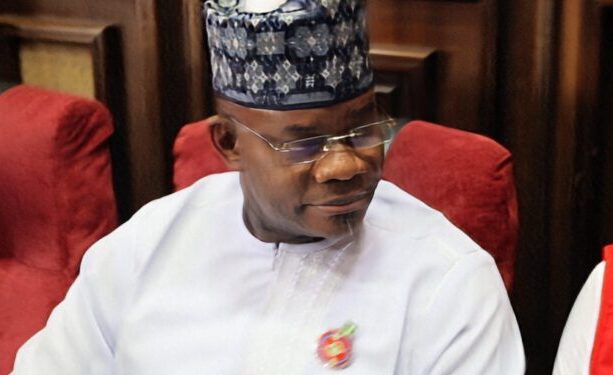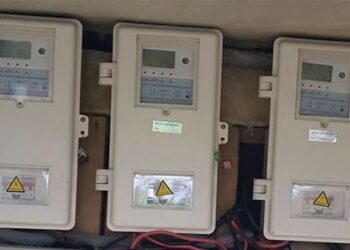EFCC witness says ex-Kogi Gov Bello not involved in Govt House account, funds withdrawal
A witness of the Economic and Financial Crimes Commission (EFCC), Mrs Abimbola Williams has told a Federal High Court in Abuja that the name of former Governor of Kogi State, Yahaya Bello did not feature in any of the account opening packages for Government House Bank account with the United Bank for Africa (UBA).
The witness, a Compliance Officer with UBA also admitted before the court that Bello’s name did not feature in all the withdrawals made from the account number 1003889575 managed by UBA for the Kogi Government House Administration while Yahaya Bello was the governor.
Testifying in a money laundering charges brought against the former governor by EFCC, the banker who was subpoenaed by court tendered the account opening packages for Government House Administration under the governorship of Bello.
The suboeana, according to the prosecution, requested for the production of the statement of account of one Maselina Njoku, from 1st January, 2019 to 31st December, 2020.
Led in evidence by EFCC counsel, Kemi Pinheiro SAN, the witness also tendered the account statements operated while Bello held sway as Chief Executive of Kogi state.
She read out series of withdrawals through cheques from the account for the government House operations.
Specifically, she named one Abdulsalami Hudu as the person handling fund withdrawals on behalf of the Government House.
However, under cross examination by Joseph Daudu SAN, the lead counsel to Yahaya Bello, the UBA Compliance Officer said that Bello’s name did not feature in virtually all transactions in respect of the bank account.
She also admitted that she was not the accounts officer of the Kogi Government House account and that the account is domiciled in Lokoja, Kogi State, and not in Area 3, Abuja, where she works.
The witness confirmed 10 withdrawals in favour of Abdulsalam Hudu, in the sum of N10 million each on December 12, 2018. She said the withdrawals were done with cheques and presented across the counter.
On cross-examination, the Defence Counsel, Joseph Daudu, SAN, asked the witness that, as a compliance officer, does her duty involve protecting the integrity of the bank from legal penalty, reputational damage and financial losses? “Yes,” she responded.
The witness was also asked to name the three signatories on the account, which she did.
For Alhaji Yakubu Ismail, who was Permanent Secretary, she said, “We only have his picture on this form.”
Daudu SAN asked, “Now, in both the account opening documents and the statement of account from E1 to E72, does the name ‘Yahaya Bello’ appear anywhere?”
“No, the name Yahaya Bello does not feature,” the witness responded.
The Defendant’s lawyer again asked, “Please look at Exhibit 2P1-3P62. Does the name ‘Yahaya Bello’ appear anywhere in the document?”
“My Lord, the name Yahaya Bello does not feature on the exhibits,” the witness answered.
Daudu SAN therefore closed his cross-examination.
The EFCC Counsel, moved to re-examine the witness. Daudu, SAN objected, but the judge allowed him after a brief argument.
Pinheiro SAN then asked the witness if she was familiar with the signature on the document.
She said she signed on behalf of one Edward Bananga.
But the Defendant’s Counsel again objected and moved to cross-examine the witness.
“My Lord, the witness initially disowned the signature, but under re-examination, the prosecution led her to admit it. Therefore, I have the right to challenge that admission and prove that her claim regarding the signature is incorrect,” he said.
“Cross examination is meant to prove the accuracy or veracity of the witness. I am entitled to disprove what she said. This is in the interest of justice,” Daudu SAN added.
He then asked the witness to read the document.
Reading from the document, she said, “I Edward Bananga hereby certified and confirmed that……”
‘I put it to you that You are not Edward Bananga,” the Defendant’s Counsel said.
“I am not Edward Bananga my lord,” the witness answered.
Another witness, Nicholas Ohehomon, from the American International School, was presented by the prosecution.
The exhibits tendered included the school’s statements of account, admission letters of the children of the defendant and payment receipts. The witness confirmed the different classes the children were admitted into.
Exhibit 12P was also tendered, which was a contractual agreement for post-paid school fees for the children.
The Prosecution presented a letter from the EFCC to AIS, Abuja, through the Registrar. It was marked Exhibit 18 and an account provided by the EFCC for a refund.
The court, thereafter, adjourned to 7th March for continuation of trial.











